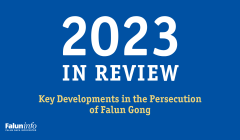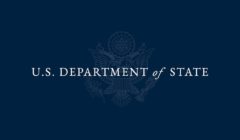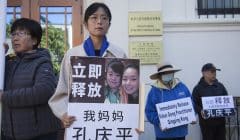Research: Top Chinese Officials Cite Falun Gong Crackdown as Central to Maintaining Regime Security
Recent Speeches List Falun Gong Ahead of Anti-Corruption, Counter-Terrorism Efforts
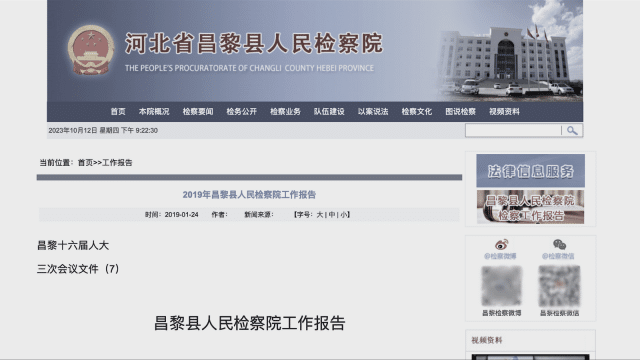
Official CCP report that mentions explicit intent to persecute Falun Gong practitioners from January 24, 2019, titled “2019 Changli County People’s Procuratorate Work Report” by the People’s Procuratorate of Changli County Hebei Province.
Key Takeaways
- Amid a renewed Chinese Communist Party focus on safeguarding regime security, the crackdown on Falun Gong is cited as a top priority for the central leadership and local authorities as suggested by work reports, speeches, and directives from at least 12 provinces dated since 2017. It is clear from over twenty references cited below that the violent campaign to eradicate Falun Gong is viewed within the party as a central component of the regime’s efforts to control the population, maintain political power, and retain ideological supremacy.
- Public references to targeting Falun Gong by top security and judicial officials as recently as January 2023 are a marked departure from years of silence, even as the persecution continued unabated throughout the country during that time.
- Such official rhetoric elevating Falun Gong as a target for repressive security operations has correlated to intensified persecution observed by the Falun Dafa Information Center since the beginning of the COVID-19 pandemic, including large-scale arbitrary detention, torture, and deaths from abuse in custody.
Introduction
Maintaining its hold on power under the guise of upholding “national security” has long been a hallmark of Chinese Communist Party (CCP) rule. Nevertheless, under the leadership of Xi Jinping, there has been a renewed focus on this effort and an elevation of its importance in the regime’s approach to governance, a trend that has further accelerated in recent years. “Political security,” which Xi described in a 2014 speech as the “bedrock of comprehensive national security ” (总体国家安全), tops the hierarchy of over a dozen areas included in the comprehensive national security framework. In May 2023, Xi called for the urgent acceleration of modernizing it.
In observing these developments, Western scholars and analysts have remarked on how this trend has also been driving increased repression, human rights abuses, and suppression of civil society. In such analysis, the regime’s crackdown on Falun Gong has almost never been mentioned. Yet a review of comments by top officials—both historically and since 2020—points to Falun Gong remaining a central part of the CCP’s efforts to maintain “political security.” Moreover, in some instances, Falun Gong has been elevated among other perceived threats to the regime or actual dangers to public safety. References on local government websites to implementing Xi’s vision also make consistent mention of Falun Gong, but are only rarely cited by think-tanks and scholars.
Public security, supreme procuratorate leadership include Falun Gong crackdown among key efforts to defend political security
In August 2020, then Chinese Minister of Public Security and State Councilor Zhao Kezhi delivered a speech to the Standing Committee of the National People’s Congress (NPC), China’s rubber-stamp parliament, highlighting work conducted from 2016 to 2019, with a focus on 2019’s accomplishments. Zhao noted that in implementing the comprehensive national security concept, the public security system had strived to “make full use of legal weapons and methods to carry out in-depth struggles against subversion, separatism, and infiltration; severely crack down on the activities of ‘Falun Gong’ […] and other [banned religions]; and resolutely defend the country’s political security.”1 In a reflection of the priority given to these efforts, Zhao highlighted measures to suppress banned religious groups like Falun Gong before mentioning other security initiatives, including those related to anti-corruption and counter-terrorism.
This is one of multiple publicly available work reports delivered by senior officials at high-level Party forums in recent years that directly addressed Beijing’s campaign against Falun Gong. Between 2017 and 2021, in their work reports to the NPC, the Supreme People’s Court (SPC) and Supreme People’s Procuratorate repeatedly mentioned “actively participating in” and “increasing the intensity” of the “struggle” against banned religions, and “resolutely punishing ‘Falun Gong’” and other banned faiths. In January 2017, at a symposium attended by presidents of high people’s courts across China, the SPC reportedly called for “the deepening of the struggle” against banned religious groups and “intensified punishments against Falun Gong” and other such groups, so as to “prevent them from becoming a prominent factor affecting political security.”
In May 2020, Zhang Jun (then procurator-general of the Supreme People’s Procuratorate) stated in a 2019 work report submitted to the NPC that they had “resolutely safeguarded national political security and social stability,” “implemented the comprehensive national security concept,” and “resolutely punished ‘Falun Gong’” and other banned religious groups. Zhang likewise mentioned anti-Falun Gong work before listing prosecutions of cases such as those related to violence and theft.
This explicit mention of Falun Gong and its prioritization among perceived threats to the regime has appeared in other speeches and reports, including three press conferences held by the Ministry of Public Security since 2021. On April 15, 2021, at a press conference on the occasion of National Security Education Day, the ministry relayed achievements from the past seven years in defending China’s “political security” and looking ahead to future work. The first target for policy implementation named in a report on the conference was Falun Gong and other banned religious groups with an emphasis on “in-depth education and transformation,” a reference to the brutal methods used to force people to renounce their beliefs and praise the CCP. This came before mentions of implementing the party’s “anti-separatist” policies in Tibet, “anti-terrorism” efforts in Xinjiang, or other priority enforcement areas such as online offenses, economic crimes, and the pursuit of former officials abroad via the “Fox Hunt” campaign. Similar comments are evident in reports on press conferences from January 2022 and January 2023 for “Chinese People’s Police Day.” In these two reports, the placement of the Falun Gong mention appears after “anti-separatist” and “anti-terrorist” campaigns, but still before any other priority areas.
Exhaustive searches of publicly available information on Chinese government websites and state media coverage indicate that these recent references to the anti-Falun Gong campaign in public press conferences follow a period of relative silence. The last such public reference on record by a senior security official appears to date back to February 2006, when Ke Liangdong, then director of the Ministry of Public Security’s Legal Affairs Department, stated that Falun Gong followers would be punished under the then newly enacted Public Security Administration Punishment Law. In the interim, local government websites continued to make reference to actions targeting Falun Gong practitioners–such as the “zero-out” campaign–but top officials have omitted mention of Falun Gong in public, ostensibly to reinforce false perceptions that the CCP had been successfully crushed the group.
Local governments follow the center’s lead
Between 2019 and 2023, many directives, work reports, and development plans issued by local governments (and judicial authorities in particular) across China have linked crackdowns on residents who practice Falun Gong with safeguarding “national security,” “political security,” “national political security,” and/or “state security.” The following are select examples:
- Hebei Province: In August 2021, the Chengde City Intermediate People’s Court published its five-year work report for 2017 to 2021. The report stated that it had “adhered to the comprehensive national security concept, earnestly put the maintenance of national political security in the first place,” including by having “severely cracked down on the infiltration and destructive activities of Falun Gong” and other banned religions, “concluding 27 cases involving [banned religions] and sentencing 59” believers. Prior to this, the Changli County People’s Procuratorate highlighted in its 2018 work report that it had “strictly cracked down on” the activities of banned religions and thereby “safeguarded national political security.” Explicitly linking these moves to central party goals and directives, it further stated that:
In accordance with the jurisdiction designated by superiors, the Procuratorate undertook the review and prosecution of cases in the city [involving] Falun Gong… Throughout the year, a total of 26 cases involving 39 people were accepted, and 24 cases involving 35 people were prosecuted. This type of case is complex and sensitive. The Procuratorate actively explored and strived to highly integrate national policies and laws. Through review, prosecution and charging of crimes, we resolutely cracked down on crimes that endangered national security, especially regime security, strengthened control of ideological positions, and effectively embodied the national will to combat this type of crime.
It is worth noting that reviews of verdicts in cases involving Falun Gong indicate the so-called “crimes” typically involve studying spiritual texts or sharing information exposing rights abuses or countering CCP propaganda rather than engaging in what would be considered violent or criminal behavior in other countries.
- Sichuan Province: Dazhou City People’s Procuratorate’s 2020 work report noted that it had “strictly cracked down on crimes that endangered political security, quickly arrested and prosecuted 6 people who spread political rumors and provoked troubles online as well as members of ‘Falun Gong’” and other banned religions.
- Jiangsu Province: In Nanjing, the Yuhuatai District People’s Court noted in its work report published in January 2022 that it “undertook half of the city’s … cases” involving banned religions, “severely punished Falun Gong and other [banned religions] in 30 cases (49 people)” and “maintained national political security.”
- Guangdong Province: The People’s Procuratorate of Chikan District, Zhanjiang City noted in its 2022 work report, prior to referencing all other criminal cases, that it had “resolutely implemented the comprehensive national security concept” and “severely punished four cases” involving “Falun Gong and other [banned religions].”
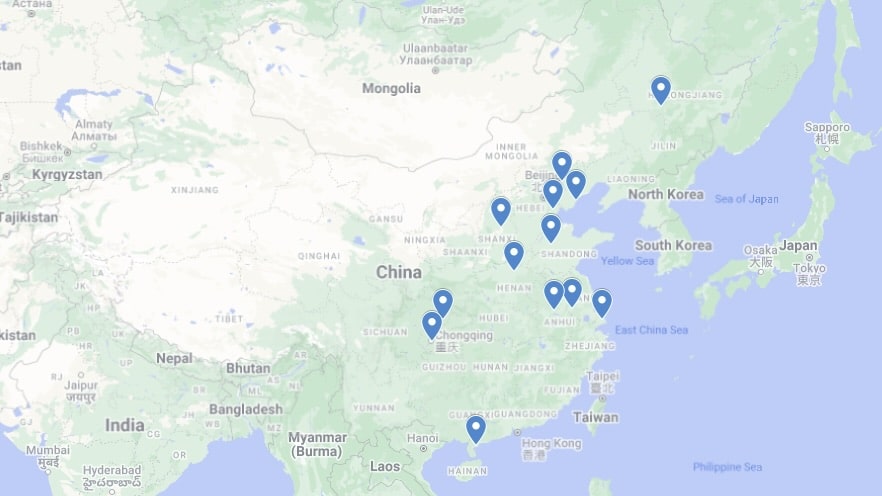
Similar references have also appeared in the directives of local authorities in Shanghai and Chongqing, work reports of officials in Shanxi, Tianjin, Shandong, and Anhui, as well as development and implementation plans in Heilongjiang and Henan provinces, among many others.
Why does it matter?
These directives and reports issued by central and local governments over the past five years are notable for several reasons.
- Revived anti-Falun Gong rhetoric: At the central level, such references mark a revival of Falun Gong as a publicly cited CCP target after over a decade of relative silence from top officials, even as the security apparatus has continued monitoring, detaining, and torturing believers throughout this period.
- Entrenchment of anti-Falun Gong campaign in security apparatus: Although local government websites and work reports have long made routine references to Falun Gong, these recent ones—with a renewed focus on political and national security—demonstrate how ingrained the campaign against the group remains in the regime’s overall security machinery, and Xi Jinping’s comprehensive national security framework in particular.
- Within the CCP, Falun Gong is not a minor target: The regime’s propaganda against Falun Gong predominantly frames persecution of the group as “anti-cult” efforts, which some observers may perceive as marginal in the context of the CCP’s broader repression. However, it is clear from the above sources that internally, the campaign to eradicate Falun Gong is viewed as a central component to the CCP’s efforts to control the population, maintain political power, and retain ideological supremacy.
- Heightened rhetoric corresponds to real-life repression: Perhaps most importantly, the elevation of Falun Gong in official rhetoric as a target for security operations correlates to intensified real-world persecution observed by the Falun Dafa Information Center and others since the beginning of the COVID-19 pandemic. This has included large-scale arbitrary detention, torture, and deaths from abuse in custody. The escalation occurred as some practitioners emerged as whistleblowers and citizen journalists providing otherwise unavailable information on conditions in locked down areas to domestic and international audiences at a time when the CCP was desperate to convey an image of having the viral outbreak under control. Other contributing factors include the enhanced sensitivity to potential dissent surrounding the October 2022 20th Party Congress, annual government meetings, and Xi’s travels to different parts of the country.
What to watch for next?
- More resources being devoted to the Falun Gong crackdown in 2024: The above findings reinforce other evidence of Falun Gong practitioners across China being a prime target of CCP repression. Although this persecution has been ongoing since 1999, the more public and prioritized references to cracking down on Falun Gong by top officials since 2019 compared to previous years could presumably lead to more resources being devoted to the detention and “transformation” of Falun Gong practitioners. Contributing to this increased focus is the upcoming 25th anniversary of the launch of the persecution and the historic peaceful appeal of practitioners in Beijing in April 1999 which preceded it. Indeed, a 2019 document from a town in Shanxi Province explicitly noted the importance of security agencies preventing any “activities from taking place on the twentieth anniversary of the Falun Gong April 25” appeal. Such directives are likely to repeat ahead of the 25th anniversary in 2024.
- Expansion of this trend beyond the security apparatus: In July 2023 , a state-run website published an article written by Li Anping, executive director of the China Anti-Cult Association, a government-sponsored NGO with close ties to the CCP bureaucracy that has helped drive the anti-Falun Gong campaign and its demonizing propaganda. In the article, Li called for the incorporation of religious repression into “maintenance of national political security” and the deep recognition that banned religious groups “post a huge threat to national security,” as the CCP defines that term.
- Renewed attention by scholars and observers given the above findings: Falun Gong remains one of the most censored topics in China and public outspokenness by experts can draw reprisals from the CCP, including restrictions on travel to China or punishment of relatives or acquaintances residing there. Nevertheless, the Falun Dafa Information Center hopes that the above research draws renewed attention to how fundamentally intertwined the human rights crisis facing Falun Gong believers in China is with the regime’s broader security ambitions. Negligent or deliberate omission of Falun Gong from analysis related to regime efforts to preserve “national security” or “political security” not only deprives innocent victims of persecution of international support, it also leaves a gaping hole in observers’ and policymakers’ understanding of contemporary China.
Sign up here to receive important updates on the Falun Gong community and the persecution believers face.
1 For the purposes of this article and to avoid repeating demonizing labels, the Falun Dafa Information Center has used the term “banned religion” in place of “xiejiao” as it appears in Chinese in many of the documents cited in this research. Often translated as “evil cult” per the CCP’s manipulation, the term “xiejiao” is a core component of the regime’s propaganda campaign to dehumanize Falun Gong practitioners and justify violence against them. Scholars of religion and other observers have consistently stated that Falun Gong is not a “cult,” while rights groups like Freedom House and Amnesty International have translated the term as “heretical organization”.





